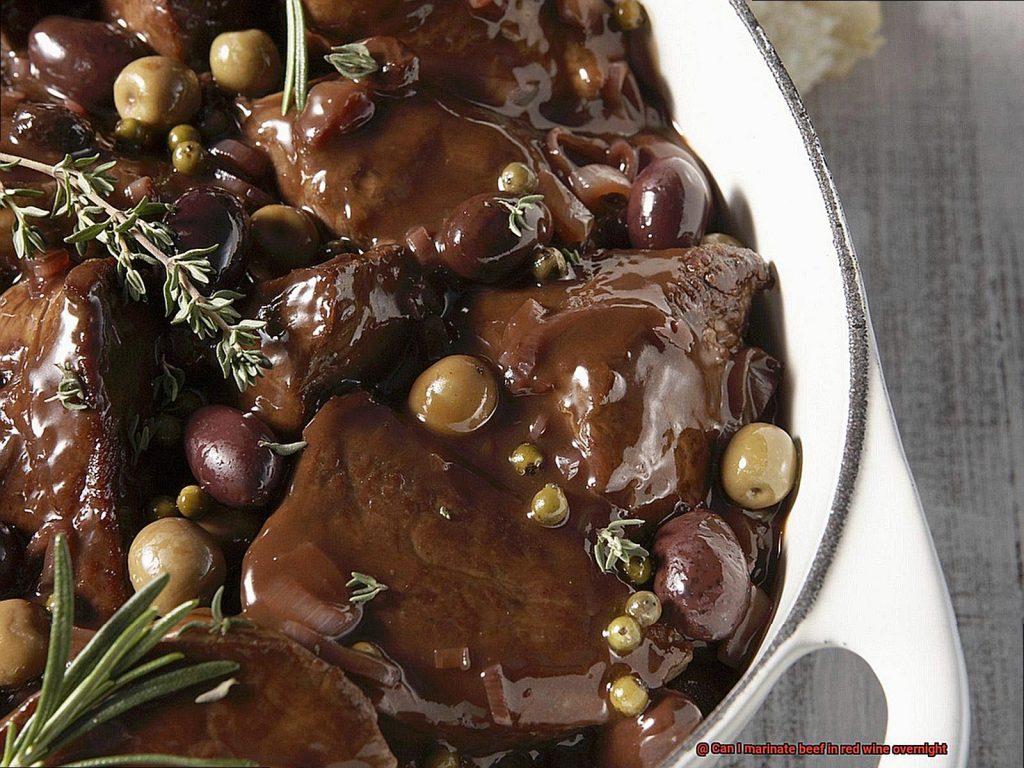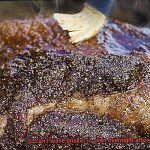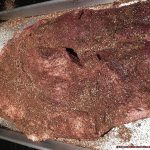Imagine this: a tantalizing piece of beef, ready to be transformed into a succulent masterpiece. You’ve heard whispers about marinating it in red wine overnight, but you’re not sure if it’s worth the effort. Well, my friend, you’ve come to the right place.
In the world of culinary experimentation, marinating meats has become a popular technique to infuse flavors, tenderize, and take your taste buds on an adventure. And when it comes to beef, red wine is like the secret ingredient that unlocks a whole new level of deliciousness.
But can you truly unleash the potential of your beef by letting it soak in red wine overnight? As an expert in all things culinary, I’m here to spill the beans (or should I say pour the wine?) and give you the lowdown on this age-old practice.
So grab a glass of your favorite red, sit back, and let’s dive into the mouthwatering wonders that await us when we marinate beef in red wine overnight.
Contents
Factors to consider before marinating beef in red wine overnight
Immerse yourself in a culinary adventure and take your grilling skills to new heights by marinating beef in red wine overnight. This technique infuses the meat with rich flavors, resulting in a tender and succulent masterpiece. However, before embarking on this flavor-packed journey, it is crucial to consider several important factors. From selecting the finest cut of beef to choosing the perfect red wine, let’s delve into the essential elements that will ensure a mouthwatering outcome.
Quality of the beef:
Embark on your marinating escapade with a premium piece of beef that is fresh, tender, and properly trimmed. Remember, marination can enhance flavors but cannot compensate for poor quality or tough meat. Opt for well-marbled cuts like ribeye or strip steak to achieve optimal results that will make your taste buds dance with joy.
Choice of red wine:
The selection of red wine is paramount as it significantly impacts the taste and overall success of your marinated beef. Opt for dry or semi-dry red wines that harmonize with the flavors of beef, such as Cabernet Sauvignon, Merlot, or Pinot Noir. Steer clear of sweet or heavily oaked wines as they may overpower the natural flavors of the meat, hindering the desired outcome.
Duration of marination:
While marinating beef overnight can yield rich flavors and tenderized meat, it is crucial not to exceed the recommended time frame. Extended marination periods can excessively break down proteins, resulting in an undesirable mushy texture. Aim for a minimum of 2 hours and a maximum of 24 hours to strike the perfect balance and achieve delectable results.
Temperature control:
Maintaining proper temperature control during marination is vital to ensure food safety. Red wine lacks sufficient acidity to inhibit bacterial growth, making refrigeration of the marinating beef imperative at all times. By doing so, you prevent the multiplication of harmful bacteria while maintaining the freshness of the meat, guaranteeing a safe and flavorsome culinary experience.
Marinade ingredients:
Beyond red wine, marinades often incorporate various herbs, spices, and acids to elevate flavors and further tenderize the meat. Consider the overall balance of flavors and carefully select complementary ingredients accordingly. Garlic, rosemary, thyme, and black pepper are exceptional choices that will infuse your marinade with depth, creating an unforgettable taste sensation.
Sensitivity to alcohol:
Take into account any sensitivities or preferences regarding alcohol consumption among those indulging in your marinated beef creation. While most of the alcohol will evaporate during cooking, trace amounts may remain. If necessary, explore non-alcoholic alternatives or opt for recipes with shorter marination times to accommodate everyone’s needs.
Choosing the right cut of beef for marinating in red wine overnight
If you want to take your grilling game to the next level, marinating beef in red wine overnight is the secret ingredient you’ve been missing. But before you embark on this flavor-packed journey, let’s explore the importance of choosing the right cut of beef for marinating in red wine overnight and how it can enhance the taste and texture of your dish.
The Flank Steak – Lean and Flavorful:
The flank steak, derived from the abdominal muscles of the cow, is a prime choice for marinating in red wine. Its loose grain absorbs flavors from marinades, while the wine’s acidity and tannins tenderize the meat. The result? A tender, flavorful steak with a rich, beefy taste that will leave your guests begging for seconds.
The Ribeye Steak – Juicy and Indulgent:

For a melt-in-your-mouth experience, look no further than the ribeye steak. With exceptional marbling and high fat content, this cut is incredibly tender and juicy. Marinating it in red wine overnight enhances the flavors, creating a succulent, indulgent steak that impresses even the toughest critics.
Top Sirloin – Lean and Versatile:
If you prefer a leaner cut but still want to enjoy the benefits of marinating in red wine, top sirloin is an excellent choice. Coming from the cow’s hip area, top sirloin is known for its tenderness. Marinating this cut not only enhances its natural flavors but also adds depth to its taste profile.
Hanger Steak and Skirt Steak – Bold and Robust:
For those who crave bold flavors, hanger steak and skirt steak are perfect options. These cuts, from the cow’s diaphragm muscle, have a strong, beefy taste. Marinating them in red wine overnight tenderizes the meat and infuses it with a rich, complex flavor that pairs well with bold seasonings.
Selecting a high-quality red wine for marinating
Elevate your grilling game and leave your guests begging for seconds with tender and succulent steaks marinated in the secret ingredient: a high-quality red wine. But not just any red wine will do. To truly enhance the flavors of your beef and add depth to your dish, selecting the right red wine is crucial.
When choosing a red wine for marinating, several factors come into play. First and foremost, seek out wines with good acidity and tannins. These components not only tenderize the meat but also add complexity to your marinade. Look for medium to full-bodied wines like Cabernet Sauvignon, Merlot, Syrah, or Zinfandel. These robust wines can stand up to the vibrant flavors of the beef.
Consider the flavor profile of the wine as well. Do you crave something fruity and jammy or prefer a more earthy and spicy note? Ponder how these flavors will complement the beef you’re marinating. For a peppery steak, a bold Syrah might be perfect, while a delicate Pinot Noir could be just right for a tenderloin.
Age matters too. Younger wines tend to be fruit-forward and exude vibrancy, while older wines develop complex flavors and aromas. Both can work well for marinating, depending on your preference and the dish at hand.
Though you need not break the bank, avoid very cheap or low-quality wines. These may contain harsh flavors or additives that could negatively impact your marinade. Opt for a wine that is reasonably priced yet ensures quality.
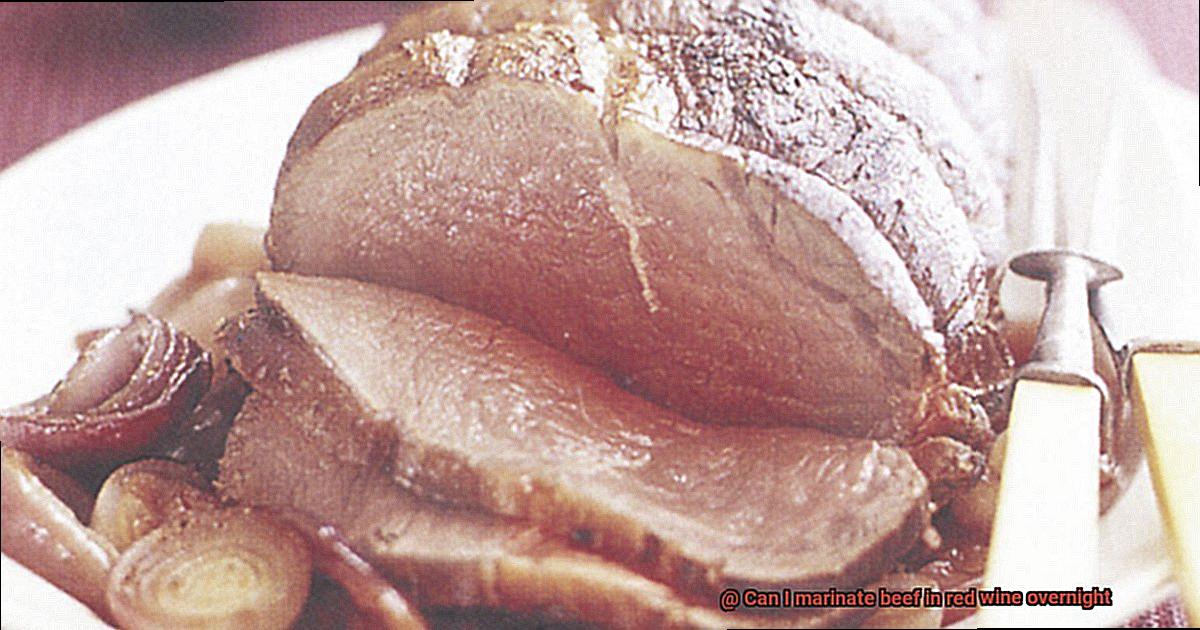
Ultimately, don’t be afraid to experiment. Everyone’s taste buds differ, so feel free to explore different grape varieties, regions, and vintages until you discover your perfect match.
Adjusting the marinating time based on personal preference
Calling all grill masters and food enthusiasts. Are you ready to embark on a flavor-filled journey that will transform your beef into a culinary masterpiece? Today, we’re diving deep into the art of marinating beef in red wine and how adjusting the marinating time based on personal preference can take your dish to new heights. So grab your favorite glass of red and let’s get started.
Marinating beef in red wine is like a symphony for your taste buds. The longer you marinate, the more opportunity for those robust flavors to infuse every fiber of your meat. But be warned, my friends, there is a fine line between perfection and over-marination. It’s all about finding that sweet spot where the flavors are enhanced, and the meat remains tender and juicy.
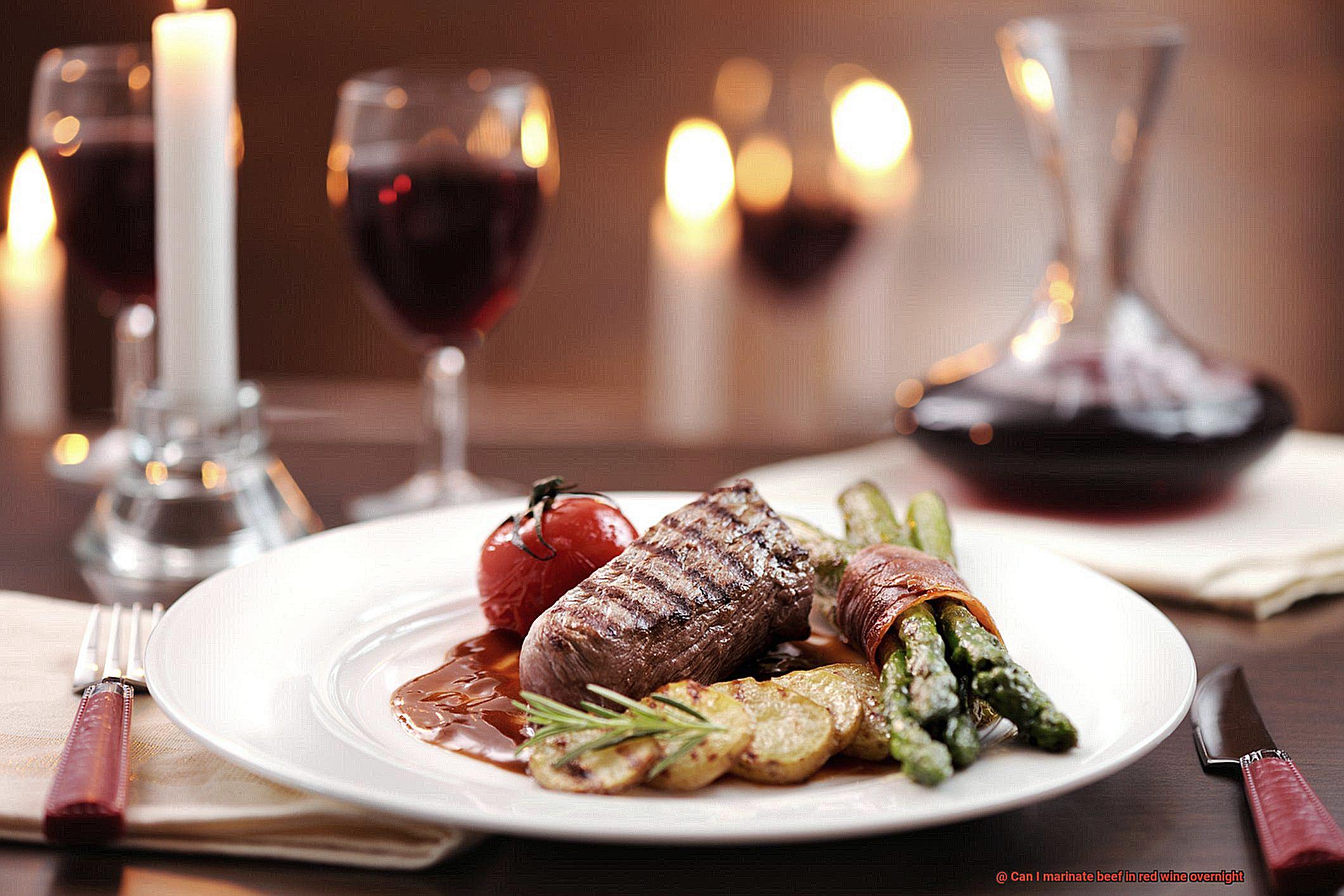
Your Unique Flavor Journey:
Personal preference is what sets each of us apart in the culinary world. Some of us crave bold, intense flavors that make our taste buds sing, while others prefer a milder, more subtle taste. Adjusting the marinating time allows you to tailor the flavor intensity to suit your palate.
Experimentation is Key:
Start with a shorter marinating time, such as a few hours, and give it a taste. If you desire more depth and complexity, extend the marinating time gradually until you achieve that perfect balance. Remember, it’s all about discovering your personal flavor journey.
Consider the Cut:
Thicker cuts or tougher meats like roasts or stewing beef require more time to tenderize. Thinner cuts, such as steaks, may not need as much marinating time. Keep this in mind when deciding how long to let your meat soak in that delicious red wine goodness.
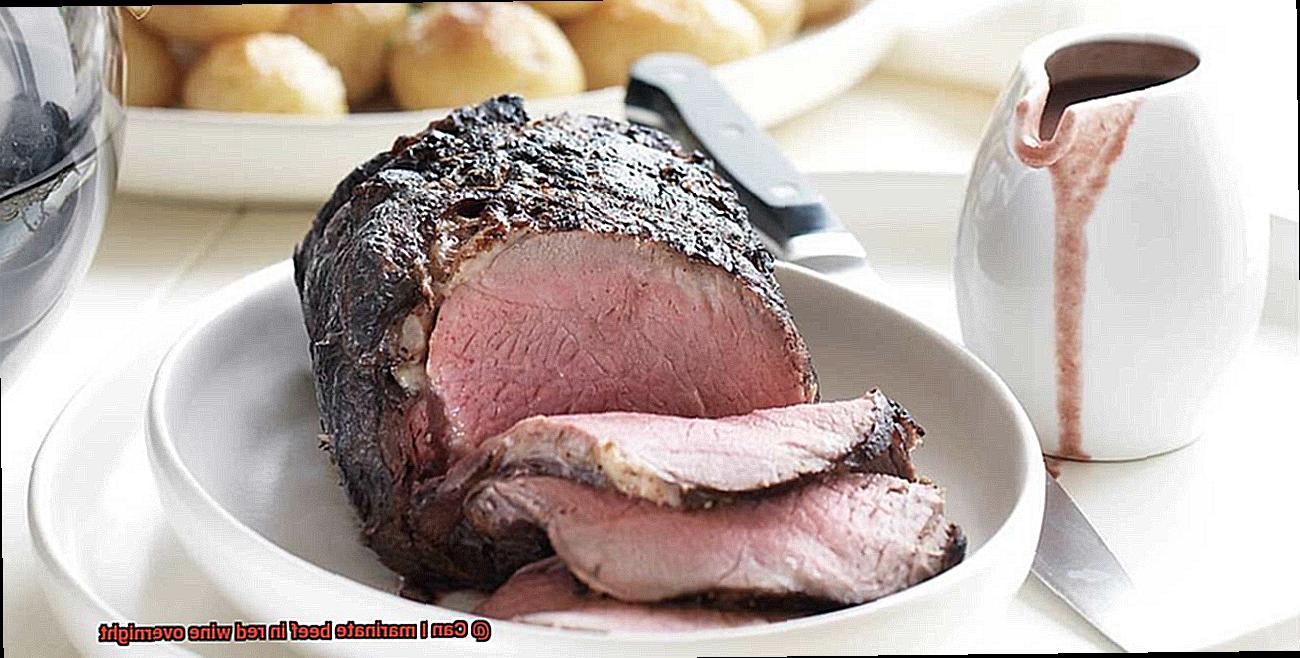
Food Safety First:
While we’re on the topic of marinating time, let’s not forget about food safety. The longer meat sits in marinade, especially at room temperature, the higher the risk of bacterial growth. Always follow food safety guidelines and refrigerate the meat during marination if extending the time beyond a few hours.
In the realm of grilling and flavor exploration, adjusting marinating time based on personal preference is an essential part of creating a dish that speaks to your taste buds. Whether you prefer a bold and intense flavor or a milder taste, finding that sweet spot will elevate your beef to new heights. So go forth, my fellow grill enthusiasts, and unleash the power of your personal flavor journey. Let the red wine marinade work its magic, and may your taste buds revel in the symphony of flavors that await.
Ensuring food safety when marinating beef in red wine overnight
Elevate your grilling prowess to new heights with the tantalizing flavors and unmatched tenderness of marinating beef in red wine overnight. However, embarking on this culinary adventure requires utmost attention to food safety. Let us delve into the essential steps and precautions that will not only tantalize your taste buds but also ensure the safety of your marinated beef.
Bacteria, those relentless microorganisms, thrive in the temperature danger zone between 40°F (4°C) and 140°F (60°C). To thwart their advances, refrigeration is paramount. Resist the temptation to leave your marinated beef on the countertop; instead, embrace the cool sanctuary of the refrigerator – the key to preserving food safety.
Before you even contemplate immersing your beef in that luscious red wine marinade, ensure your hands are immaculately clean. Thoroughly wash them with soap and water before and after handling raw meat; this simple act is your shield against cross-contamination and unwelcome bacterial hitchhikers.
Containers play a crucial role in this marinating symphony. Opt for a food-safe plastic bag or a non-reactive container with a secure lid. These fortifications prevent leakage and contamination from other foods, ensuring safety remains at the forefront.
Within the cool confines of your refrigerator, maintain the chill throughout the entire marinating process. Yes, even overnight. Set your refrigerator’s temperature below 40°F (4°C) to impede bacterial growth, effectively deterring those mischievous microorganisms.
For an added layer of food safety, consider incorporating an acid ingredient such as vinegar or lemon juice into your marinade. These acids possess dual powers – inhibiting bacterial growth while bestowing a tangy zest upon your taste buds.
Once the marinating journey is complete, bid farewell to any leftover marinade that has mingled with raw meat. Resist the temptation to reuse it for basting or sauce; instead, discard it to prevent the introduction of harmful bacteria from raw meat into your cooked delicacies.
When it’s finally time to unleash your culinary prowess on the grill, ensure that marinated beef is thoroughly cooked. Employ a trusty meat thermometer and ascertain that the internal temperature reaches at least 145°F (63°C) for medium-rare or 160°F (71°C) for medium. This dual benefit ensures a perfect steak while annihilating any lurking bacteria within.
Lastly, trust your senses when it comes to food safety. Should your marinated beef emit an off-putting odor or appear slimy, err on the side of caution and discard it. Remember, safety is the cornerstone of culinary excellence.
Preparing the meat before grilling or cooking after marination
Get ready to embark on an epicurean journey that will take your grilling prowess to new heights. Today, we will explore the art of preparing meat before grilling or cooking after marination. Prepare to indulge in tender, flavorful beef infused with the richness of red wine. But before we dive into the marinade, let’s equip ourselves with the knowledge and techniques to create a masterpiece on the grill.
Selecting the Perfect Cut:
To set the stage for grilling greatness, start by choosing a cut of beef known for tenderness and flavor. Ribeye, sirloin, and flank steak are excellent options. Trim any excess fat to prevent flare-ups during cooking and ensure even doneness.
Seasoning to Perfection:
Before marinating, season the beef generously with salt and pepper. This step enhances the natural flavors, tenderizes the meat, and adds an extra layer of deliciousness.
Marinating Magic:
Prepare a marinade using full-bodied red wine like Cabernet Sauvignon or Merlot. Add garlic, herbs (rosemary or thyme), and spices (black pepper or paprika) for an explosion of flavors. Place the seasoned beef in a container that allows full submersion in the marinade, ensuring every nook and cranny is infused with goodness. Refrigerate for at least 4 hours or overnight – the longer, the better.
Drying and Resting:
Once marinated, remove the beef from the marinade and pat it dry with paper towels. This step removes excess moisture and allows for better searing and browning during cooking. Let the meat come to room temperature for about 30 minutes before grilling to ensure even cooking and prevent toughness.
Safe and Sizzling Grilling:
Now, it’s time to unleash the flavors on the grill. Follow proper cooking times and temperatures, using a trusty thermometer to ensure food safety and achieve your preferred level of doneness. Whether grilling over direct heat or cooking in a pan or oven, let your senses guide you to culinary excellence.
Enhancing flavor with additional ingredients in the marinade
If you want to create a truly unforgettable beef dish, look no further than the marinade. The secret to enhancing the flavor of your beef lies in the art of incorporating additional ingredients into your marinade. By doing so, you can transform your meat into a culinary masterpiece that will have everyone begging for seconds.
Let’s start with herbs and spices. Imagine the tantalizing aroma of rosemary and thyme infusing your beef with a rich and savory taste. Add a hint of garlic and a sprinkle of black pepper, and you have a flavor profile that is simply irresistible. These ingredients not only awaken your senses but also elevate the overall taste of the meat.
If you’re looking to add a tangy and refreshing note to your beef, citrus fruits are your secret weapon. Squeeze some lemon or orange juice into your marinade, and watch as the meat becomes tenderized and bathed in a bright and zesty flavor. The acidity of the citrus also works its magic by breaking down the fibers in the beef, resulting in a more tender and flavorful outcome.
For those with a sweet tooth, don’t be afraid to incorporate some honey, brown sugar, or maple syrup into your marinade. These natural sweeteners not only add depth to the flavor but also work their magic on the grill. As the meat caramelizes, a delicious crust forms, making your taste buds sing with delight.
To add a savory umami flavor that leaves you craving for more, reach for soy sauce or Worcestershire sauce. These ingredients contain natural glutamates that enhance the overall taste of the beef, making it more savory and satisfying.
And let’s not forget about heat and spice. Imagine a tantalizing kick from chili flakes, paprika, or hot sauce without overpowering the natural taste of the beef. These spices provide an exciting burst of flavor that leaves a lingering warmth on your palate.
Finally, let’s talk vinegar. Picture the tenderizing effect of balsamic or apple cider vinegar combined with its tangy and slightly acidic taste that complements the richness of red wine. Incorporating vinegar into your marinade adds another layer of complexity that will leave your guests impressed.
Avoiding cross-contamination and proper handling of leftover marinade
Avoiding cross-contamination and proper handling of leftover marinade are essential to prevent your mouthwatering creations from turning into a recipe for disaster. So, why is this so important?
Let’s start with cross-contamination. Picture this: harmful bacteria or microorganisms transferring from one food or surface to another. No one wants a side of food poisoning with their perfectly cooked steak, right? To minimize the risk, it’s vital to handle raw meat and marinade separately. Use separate cutting boards, utensils, and containers to significantly reduce the chances of cross-contamination.
Now, let’s dive into the world of leftover marinade. We understand the desire to salvage that burst of flavor, but here’s the deal: leftover marinade that has come into contact with raw meat can harbor harmful bacteria. Consuming it could result in some rather unpleasant foodborne illnesses.
But fear not, my grilling friends. There are ways to rescue that leftover marinade without compromising safety. If you want to use it as a basting sauce or flavor enhancer, simply boil it for at least 5 minutes. This process will eliminate any bacteria present, rendering it safe for consumption.
Feeling adventurous? Why not transform that leftover marinade into a delectable sauce or gravy? Simmer it with onions, garlic, herbs, and broth, and voila. You’ll have a flavorful accompaniment for your perfectly grilled beef.
Timing is everything though. If you plan on reusing the marinade, do so immediately after cooking the meat. Leaving it at room temperature for too long provides a breeding ground for bacteria multiplication, rendering it unsafe for consumption.
And let’s not forget about proper storage. If you’re not using the leftover marinade right away, refrigerate it promptly in a clean, airtight container. It can stay in the fridge for 3-4 days, but be cautious not to reuse it if it has come into contact with raw meat.
xbY9A4-U2Wc” >
Conclusion
In conclusion, marinating beef in red wine overnight is not only possible but highly recommended.
The rich flavors of the wine infuse into the meat, creating a tender and succulent dish that will impress your taste buds. The acidity of the wine helps to break down the proteins in the beef, resulting in a more tender texture.
Additionally, the tannins present in red wine add depth and complexity to the flavor profile of the meat.

